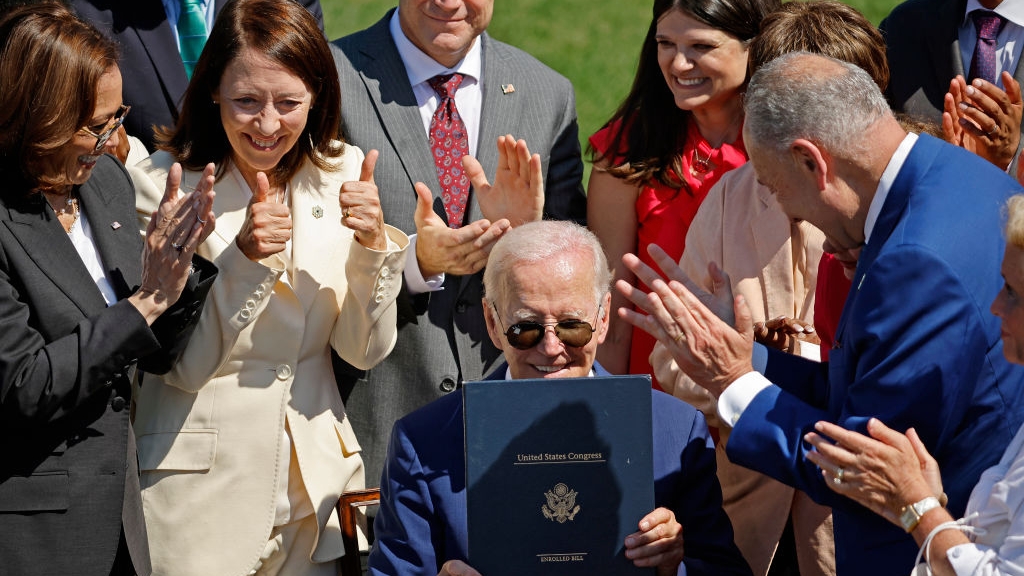The executive order sets six priorities for implementing the chip law, including “rigorous” application review, focusing on national security needs, reducing reliance on foreign production, and protecting long-term leadership in microelectronics. On the 9th of this month, Biden officially signed the “Chips and Science Act 2022” into law.
On the evening of the 25th, U.S. Commerce Secretary Gina Raimondo said in a statement on Twitter, “We will act as quickly as possible to deploy these funds, while ensuring the time required for due diligence. This plan is a long-term economic and national security of the United States. investment, we will take the necessary steps to ensure its success.”
Liu Peizhen, director of the Industrial Economics Database of the Taiwan Academy of Economics and director of APIAA, believes that this will gradually reduce the transfer of the entire related production capacity at this stage, and gradually return to the United States. She told Voice of Hope: “The United States has also corrected the excessive inclination of the entire semiconductor production capacity to Asia over the past decade, especially (to) China, through the use of this American manufacturing and alliance approach.”
Professor Yu Weixiong, an economist at the UCLA Anderson Forecast Center, told Voice of Hope that in the past few years, US-China relations have deteriorated, conflicts and confrontations have increased. This also makes the world see the CCP’s goals and ambitions. In the confrontation between the two hegemons, the development of science and technology requires the support of the state.
He analyzed that the United States has learned that chips directly affect national security and interests. “The change in the U.S. strategic strategy is very important. It is the next three to five years to subsidize companies to produce in the U.S., indicating that the U.S. government is aware of the urgency. Indeed, the “security” of the U.S. future chip production supply chain is very important A milestone. It will play a very good role in inhibiting the development of the CCP’s chips, and it will have a clamping effect.”
In addition, Biden ordered the establishment of a 16-member cross-agency CHIPS Implementation Steering Council, led by White House chief economic adviser Brian Deese, to oversee the rollout of funds.
The Department of Commerce also launched the CHIPS.gov website as a central hub for implementation. Include opportunities and timetables for funding.
Liu Peizhen analyzed that the future development of China’s semiconductors and technological breakthroughs must rely on themselves. However, this part of the “block” in the United States still has advanced semiconductor equipment and mature manufacturing equipment. “In addition, some key chips at the core are still oligopolized by American companies. Of course, for China (the CCP) to make a single-point breakthrough, in fact, there will still be considerable difficulties in the future.”
It is unclear when the Commerce Department will officially release funds to potential applicants and how long the process will take.
The Chip Act specifically sets up a “firewall” provision that prohibits companies from investing in some chip factories or semiconductor facilities in countries such as China within 10 years of receiving federal funding. To ensure that the Act protects the competitiveness of the U.S. semiconductor industry.
Yu Weixiong analyzed that chips are no longer purely general commodities, and have the importance of their national security strategies. Therefore, the United States hopes that the world‘s most advanced and top manufacturers will set up factories in the United States, such as TSMC. “Chip is a very important part of military and national security.”
“Therefore, the Taiwan government, enterprises and people must understand that this is one of the most important keys to the survival and sustainable development of the entire country in the future. To become a trusted ally of the United States, what Taiwan gains is freedom, democracy, Sustainable development environment.” Yu Weixiong said.
He believes that the US passed the “Chip and Science Act” to enhance the competitiveness of the US technology field against the CCP. By subsidizing U.S. chip manufacturing and expanding funding for scientific research, the persistent shortage of U.S. chips will be alleviated. And chip shortages have affected everything from weapons to cars to washing machines to game consoles.
Yu Weixiong said that major chip factories may choose to go to the United States, after all, it is the most advanced, highest and largest market. And Taiwan must be viewed from a higher and broader perspective, because now with the rise of China (the CCP), China’s ambitions are hostile to Taiwan.
